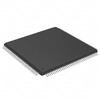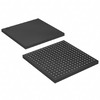Manufacturer Part Number
XC2S50-6FGG256C
Manufacturer
xilinx
Introduction
The XC2S50-6FGG256C is a Spartan-II series embedded FPGA (Field Programmable Gate Array) from Xilinx. It offers a high-performance, low-power solution for a wide range of embedded applications, providing a flexible and configurable hardware platform for custom design implementation.
Product Features and Performance
384 Configurable Logic Blocks (CLBs) with 1,728 logic cells
32,768 total RAM bits
176 I/O pins
50,000 logic gates
375V ~ 2.625V operating voltage
0°C ~ 85°C operating temperature range
256-BGA (Ball Grid Array) package
Product Advantages
Highly configurable and reconfigurable hardware platform
Low power consumption for energy-efficient designs
Broad range of embedded applications supported
Robust performance and reliability
Key Reasons to Choose This Product
Flexible and customizable hardware solution for diverse embedded systems
Optimized power efficiency for battery-powered or thermally constrained applications
Proven reliability and performance from the Spartan-II FPGA family
Comprehensive development tools and ecosystem support from Xilinx
Quality and Safety Features
Industrial-grade packaging and thermal management
Rigorous quality control and testing processes
Compliance with relevant safety and environmental standards
Compatibility
The XC2S50-6FGG256C is compatible with a wide range of peripheral components and interfaces commonly used in embedded systems, including:
Microcontrollers
Memory devices
Sensors and actuators
Communication protocols (e.g., UART, SPI, I2C)
Application Areas
The XC2S50-6FGG256C can be utilized in a variety of embedded applications, such as:
Industrial automation and control
Automotive electronics
Medical devices
Telecommunications equipment
Consumer electronics
Military and aerospace systems
Product Lifecycle
The XC2S50-6FGG256C is currently in the Last Time Buy phase, indicating it is nearing the end of its lifecycle. Customers are advised to contact our website's sales team for information on equivalent or alternative FPGA models that may be suitable replacements.

 XC2S50-6TQG144CXILINX
XC2S50-6TQG144CXILINX XC2S50-5TQG144IAMDIC FPGA 92 I/O 144TQFP
XC2S50-5TQG144IAMDIC FPGA 92 I/O 144TQFP XC2S50-6FG256CAMDIC FPGA 176 I/O 256FBGA
XC2S50-6FG256CAMDIC FPGA 176 I/O 256FBGA